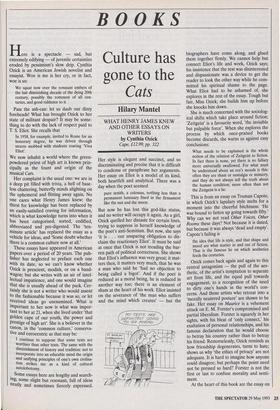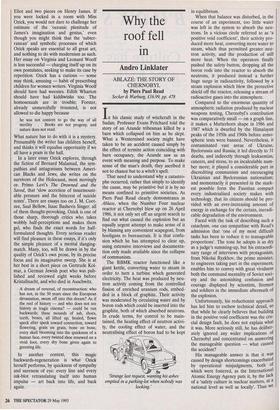BOOKS
Culture has gone to the Cats
Hilary Mantel
WHAT HENRY JAMES KNEW AND OTHER ESSAYS ON WRITERS by Cynthia Ozick Cape, £7 2.99, pp. 322 Here is a spectacle — sad, but extremely edifying — of juvenile certainties eroded by pessimism's slow drip. Cynthia Ozick is an American Jewish novelist and essayist. Woe is me is her cry, or in fact, woe is us:
We squat now over the remnant embers of the last diminishing decade of the dying 20th century, possibly the rottenest of all cen- turies, and good riddance to it.
Pass the ash-can: let us daub our dizzy foreheads! What has brought Ozick to her state of militant despair? It may be some- thing to do with the lack of respect paid to T. S. Eliot. She recalls that
In 1958, for example, invited to Rome for an honorary degree, he was driven through streets mobbed with students roaring 'Viva Eliot'.
We now inhabit a world where the green- powdered priest of high art is known prin- cipally as the fount and origin of the musical Cats.
Her complaint is the usual one: we are in a deep pit filled with trivia, a hell of base- less chattering, butterfly minds alighting on the ephemeral and flitting away again. No one cares what Henry James knew; the thirst for knowledge has been replaced by an easily-satisfied craving for information, which is what knowledge turns into when it has been categorised, sorted, codified, abbreviated and pre-digested. The 'ten- minute article' has replaced the essay as a vehicle for ideas, and 'Some doubt whether there is a common culture now at all.'
These essays have appeared in American papers over a period of 20 years. The pub- lisher has neglected to preface each one with its date, so we can't know whether Ozick is prescient, modish, or on a band- wagon; but she writes with an air of intel- lectual impatience, and one would imagine that she is usually ahead of the pack. Cer- tainly she is not a writer who would assent to the fashionable because it was so, or let received ideas go unexamined. What is important to her now is what was impor- tant to her at 21, when she lived under 'that golden cape of our youth, the power and prestige of high art'. She is a believer in the canon, in the 'common culture,' conserva- tive and eurocentric as that may be: I continue to suppose that some texts are worthier than other texts. The same with the diminishment of history and tradition: not to Incorporate into an educable mind the origin and unifying principles of one's own civilisa- tion strikes me as a kind of cultural autolobotomy.
Some essays here are lengthy and search- ing; some slight but resonant, full of ideas neatly and sometimes fiercely expressed. Her style is elegant and succinct, and so discriminating and precise that it is difficult to condense or paraphrase her arguments. Her essay on Eliot is a model of its kind, both heartfelt and analytical. There was a day when the poet seemed
pure zenith, a colossus, nothing less than a permanent luminary fixed in the firmament like the sun and the moon.
But now he has lost this god-like status, and no writer will occupy it again. As a girl, Ozick quelled her distaste for certain lines, trying to suppress in herself knowledge of the poet's anti-Semitism. But now, she says `it is . . . our unsparing obligation to dis- claim the reactionary Eliot'. It must be said at once that Ozick is not treading the bar- ren path of political correctness. She shows that Eliot's influence was very great; it mat- ters then, it matters very much, that he was a man who said he 'had no objection to being called a bigot'. And if the poet is reduced as a moral being, he is reduced in another way too; there is an element of sham at the heart of his work. Eliot insisted on the severance of 'the man who suffers and the mind which creates' — but the biographers have come along, and glued them together firmly. We cannot help but connect Eliot's life and work, Ozick says; his insistence that the text was disinterested and dispassionate was a device to get the reader to look the other way while he com- mitted his spiritual shame to the page. What Eliot had to be ashamed of, she explores in the rest of the essay. Tough but fair, Miss Ozick; she builds him up before she knocks him down.
She is much concerned with the sociolog- ical shifts which take place around fiction; `Zeitgeist' is a favourite word, 'the invisible but palpable force'. When she explores the process by which once-praised books become discards, she warns us against easy conclusions:
What needs to be explained is the whole notion of the relation of Zeitgeist to fiction. In fact there is none, yet there is no fallacy more universally swallowed. For what must be understood about an era's moods is this: often they are sham or nostalgia or mimicry, and they do not always tell the truth about the human condition; more often than not the Zeitgeist is a lie.
This is from an essay on Truman Capote, in which Ozick's lapidary style melts for a moment into the cheerful bitchiness: 'He was bound to fatten up going towards fifty.' Why can we not read Other Voices, Other Rooms these days? Not because it is dated, but because it was always 'dead and empty'. Capote's failing is
the idea that life is style, and that shape and mood are what matter in and out of fiction. That is the famous lie on which aesthetics feeds the centuries.
Ozick comes back again and again to this central antagonism — the pull of the aes- thetic, of the artist's temptation to separate art from life, and the equal pull towards engagement, to a recognition of the need to dirty one's hands in the world's con- cerns. And those artists who retreat into a `morally neutered posture' are shown to be fake. Her essay on Maurice is a vehement attack on E. M. Forster's compromised and partial liberalism. Forster is squarely in her sights, with his bleat of 'only connect,' his exaltation of personal relationships, and his famous declaration that he would choose to betray his country rather than to betray his friend. Remorselessly, Ozick reminds us how friendship degenerates, turns to hate; shows us why 'the ethics of privacy' are not adequate. It is hard to imagine how anyone could disagree; but perhaps the point need not be pressed so hard? Forster is not the first or last to confuse morality and senti- ment.
At the heart of this book are the essay on Eliot and two pieces on Henry James. If you were locked in a room with Miss Ozick, you would not dare to challenge her estimate of the 'oceanic plenitude of James's imagination and genius,' even though you might think that the 'subter- ranean' and symbolic processes of which Ozick speaks are essential to all great art, and nothing to do with modernism as such. Her essay on Virginia and Leonard Woolf is less successful — charging itself up on its own postulates, seeking to make its case by repetition. Ozick has a curious — some may think, amusing — habit of prescribing children for women writers. Virginia Woolf should have had weenies. Edith Wharton should have had kiddiwinks too. The homosexuals are in trouble; Forster, already unmercifully trounced, is not allowed to die happy because
he was not content to go the way of all sterility . . . Books are not progeny, and nature does not read.
What nature has to do with it is a mystery. Presumably the writer has children herself, and thinks it will equalise opportunity if we all have a pram in the hall.
In a later essay Ozick explores, through the fiction of Bernard Malamud, the sym- pathies and antagonisms between Ameri- can Blacks and Jews; she writes on the survivors of the Holocaust, most movingly or Primo Levi's The Drowned and the Saved, that 'slow accretion of insurmount- able pressure and the bitterest of suicide notes'. There are essays too on J. M. Coet- zee, Saul Bellow, Isaac Bashevis Singer: all of them thought-provoking. Ozick is one of those sharp, thorough critics who takes wobbly half-perceptions and makes them gel, who finds the exact words for half- formulated thoughts. Every serious reader will find pleasure in these essays, if it's only the simple pleasure of a mental slanging- match. Many, too, will be drawn in by the quality of Ozick's own prose, by its precise focus and its imaginative sweep. She is at her best in a short piece on Gertrude Kol- mar, a German Jewish poet who was pub- lished and reviewed eight weeks before Kristallnacht, and who died in Auschwitz.
A dream of reversal, of reconstruction: who has not, in the 50 years since the European devastation, swum off into this dream? As if the reel of history — and who does not see history as tragic cinema? — could be run backwards; these mounds of ash, shoes, teeth, bones, all lifted up, healed, flown speck after speck toward connection, toward flowering, grain on grain, bone on bone, every skull blooming into the quickness of a human face, every twisted shoe renewed on a vivid foot, every dry bone given again to greening life.
In another context, this magic backwards-regeneration is what Ozick herself performs, by quickness of sympathy and sureness of eye: every line and every ink-blot retranslating itself into human impulse — art back into life, and back again.



















































 Previous page
Previous page